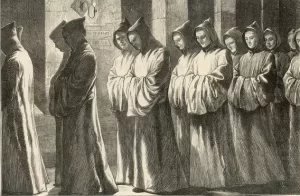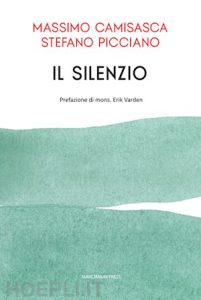Archive, Books
Silence
This essay was written as a preface to Monsignor Massimo Camisasca‘s book Il silenzio, just published. You can find an English version by scrolling down.
Un aspetto della vita monastica che apprezzo sempre di più con il passare del tempo è la statio. La statio è, come suggerisce il nome, il fermarsi. Si riferisce al momento appena prima della Messa, o prima di un’Ora dell’Ufficio Divino, quando i monaci si raccolgono in silenzio affinché i loro corpi possano trovare quiete, le loro menti e i loro cuori pace. Si preparano per il mistero che stanno per celebrare.
La statio può aver luogo nel chiostro o in chiesa. Nel chiostro, prima dei vespri, per esempio, la comunità si mette in fila sempre lungo la stessa parete. I fratelli si ordinano in fila, con levità, ognuno al proprio posto. Il rango nel monastero è determinato oggettivamente, dedotto semplicemente dall’ora di ingresso di una persona. Così, dice san Benedetto, se due fratelli entrano nel monastero lo stesso giorno, uno alla prima ora, l’altro alla seconda, il secondo saprà di essere più giovane di quello che è arrivato per primo. I due trascorrono la loro vita fianco a fianco, nel coro, nel refettorio, nel capitolo. Diventano fonte di stabilità, persino di identità, l’uno per l’altro.
La quiete della statio deriva in non piccola misura dal fatto che ognuno sa esattamente quale è il suo posto. Lo si attende esattamente lì; se manca, tutto l’insieme rimarrà in qualche modo imperfetto.
Una volta al suo posto, il monaco resta in attesa, così come i suoi confratelli. Di solito indossa la cocolla, la veste dalle lunghe maniche che è segno della sua consacrazione, e si copre la testa con il cappuccio. Chi osserva da lontano una comunità così radunata percepisce i suoi membri quasi fossero identici, come i pezzi degli scacchi, solo con piccole divertenti variazioni dovute all’altezza e alla circonferenza.
Chiunque conosca da vicino un qualunque monastero sa quanto sia illusoria questa impressione. Una gamma inverosimile di caratteri e sensibilità costituisce ciò che San Benedetto chiama il corpus monasterii, quella chiesa in miniatura in cui tutti sono membri di un unico corpo vivente. Il fatto di essere vestiti allo stesso modo, di indossare il segno di un ideale condiviso, non elimina la diversità, ma la contiene, consentendo agli individui di progredire (a volte in modo laborioso) in una concreta realtà di comunione che consente alle tensioni personali e comunitarie di essere risolte nella pace.
Trovarsi regolarmente nella statio significa ricongiungersi decisamente con ciò che si è e dove ci si trova. È dire: “Questo è ciò che sono; questa è la compagnia che servirò, che amerò e a cui sarò fedele; questo è il mio campo di battaglia e potenzialmente il mio paradiso”.
Riconoscere questa realtà in silenzio, prendendovi gusto, è costruttivo nel senso più profondo del termine. Mi edifica, distaccandomi da tutto ciò che mi frammenta e mi distrae, e mi radica in un contesto allo stesso tempo sociale e soprannaturale. Stare in silenzio quindi significa essere intensamente vigili, invitati ad acconsentire alle cose così come sono affinché la loro fecondità possa essere rivelata.
Il vero silenzio non è mai semplicemente assenza di rumore. Silenzio significa ascoltare; e ascoltare, come sa ogni monaco, significa essere chiamati a dare una risposta a ciò che si sente. In latino, il legame tra audire e oboedire, tra l’ascolto e l’obbedienza, è etimologicamente evidente; un termine palesemente deriva dall’altro. Per tutti noi, tuttavia, non importa quale lingua parliamo, questa connessione deve essere fatta esistenzialmente, nel modo in cui edifichiamo la nostra vita.
Il silenzio, oggigiorno, è difficile da trovare. Molti ne sono affamati. Molti lo cercano, solo per scoprire che, stabiliti in qualche luogo remoto o in un ritiro austero, con tutti i loro aggeggi spenti, non lo possono sopportare. Silenziare le voci esterne ci rende stranamente consapevoli della cacofonia di voci che gridano dentro. Per affrontarle, abbiamo bisogno di umiltà, coraggio e perseveranza. Antonio il Grande scrisse nel quarto secolo: “Chi dimora nel deserto e persiste nella quiete [in hesychia] è liberato da tre specie di combattimenti, quelli dell’udito, del pettegolezzo e della vista; può dedicarsi completamente a un’unica battaglia, quella del cuore”.
Per noi che viviamo in un universo di distrazione onnipresente e dittatoriale, quest’ultima battaglia è ancora più impegnativa di quanto non lo fosse per lui. Perché i nostri cuori non hanno forse perso in gran parte l’abitudine al silenzio? Il silenzio non è forse per noi un universo quasi mitico o un’utopia, per giunta leggermente minaccioso? Noi moderni dobbiamo imparare a stare in silenzio. La gioia del silenzio è per noi un gusto che dobbiamo acquisire, proprio come un palato brutalizzato da bevande eccessivamente zuccherate deve sottoporsi a un lento apprendistato, un digiuno dalle sensazioni travolgenti per assaporare la delicatezza di un raffinato tè al gelsomino.
Monsignor Massimo Camisasca ci ha fatto il gentile e pastorale favore, in questo libro essenziale, di insegnarci, con passi alla nostra portata, come entrare nel mondo del silenzio, trasformando quello che potrebbe sembrare un raggiungere la luna in un pellegrinaggio graduale e ricco di grazia. Questo libro sarà una benedizione per molti. Quanto più silenzioso sarà il lettore, tanto più profonda e paradossalmente melodiosa sarà la sua risonanza.

An aspect of monastic life I appreciate ever more as time passes is the statio. The statio is, as the name suggests, a standing-still. It refers to the time just before Mass, or before an Hour of the Divine Office, when the monks recollect themselves quietly so that their bodies may find stillness, their minds and hearts peace. They ready themselves for the mystery they are about to celebrate.
The statio may take place in the cloister or in church. In the cloister, before vespers, say, the community lines up along a designated wall, always the same. The brothers slip into line, each finding his designated place with ease. Rank in the monastery is determined objectively, deduced quite simply from a person’s time of entry. Thus, says St Benedict, if two brothers enter the monastery on the same day, one at the first, the other at the second hour, the second shall know that he is junior to the one who turned up first. The two spend their lives side by side, in choir, in the refectory, in chapter. They are a source of stability, even of identity, to one another.
The stillness of the statio in no small measure derives from the fact that each knows exactly where he belongs. He is awaited in that particular place; if he is missing, the whole will somehow remain imperfect.
Once he is in place, the monk waits, like his brethren. He typically wears his cowl, the long-sleeved garment representing his consecration, and draws its hood over his head. An onlooker seeing from afar a community thus assembled will perceive its members as near-identical, as if they were chessmen, only with small humorous allowances made for evident differences of height and girth.
Anyone who knows an ordinary monastery up close will know how illusory this impression is. An improbable range of characters and sensibilities typically make up what St Benedict calls the corpus monasterii, that miniature church in which all are members of a single living body. The fact of being dressed the same, of wearing a mark of a shared aspiration, does not eradicate diversity, but contains it, enabling individuals to flourish (sometimes challengingly) within a concrete reality of communion that lets tensions personal and communal be resolved peacefully.
To find oneself regularly in statio is to reconnect deliberately with what and where one is. It is to say: ‘This is who I am; this is the society in which I will serve, love, and be faithful; this is my battleground, and potentially my paradise.’
To acknowledge this reality silently, savouring it, is constructive in the deepest sense of that term. It builds me up, drawing back from all that fragments and distracts me, rooting me in a setting at once social and supernatural. To stand thus silently is to be intensely alert, invited to consent to things as they are in order that their fruitfulness may be revealed. True silence is never merely the absence of noise. Silence means listening; and to listen, as any monk knows, is to be summoned to give a response to what is heard. In Latin, the bond between audire and oboedire, listening and obedience, is etymologically self-evident; one term is demonstrably derived from the other. For all of us, though, no matter which language we speak, this connection must be made existentially, in the way we construct our lives.
Silence, these days, is hard to find. Many are hungry for it. Many seek it out, only to find that, established in some remote place or austere retreat, with all their gadgets switched off, they cannot bear it. The silencing of voices without uncannily makes us aware of the cacophony of voices crying within. To confront these, we need humility, courage, and perseverance. Anthony the Great wrote in the fourth century: ‘He who abides in the desert and persists in stillness [in hesychia] is delivered from three combats, those of hearing, of gossip, and of sight; he can devote himself fully to a single battle, that of the heart.’ For us who live in a universe of omnipresent and dictatorial distraction, this last battle is more demanding still than it was for him. For have our hearts not largely lost the habit of silence? Is silence to us not a quasi-mythical world or utopia, a slightly menacing one at that? We moderns need to learn to be silent. The delight of silence is to us a taste we must acquire, much the way a palate brutalised by sugary soft drinks must undergo a slow apprenticeship, a fasting from overwhelming sensation to relish the distinction of fine jasmine tea.
Monsignor Massimo Camisasca has done us the kind and pastoral favour, in this essential book, of teaching us in manageable steps how to enter the world of silence, turning what might seem like a moon-landing into a gradual and gracious pilgrimage. This book will be a blessing to many. The silenter the reader, the more profound and paradoxically melodious its resonance will be.

